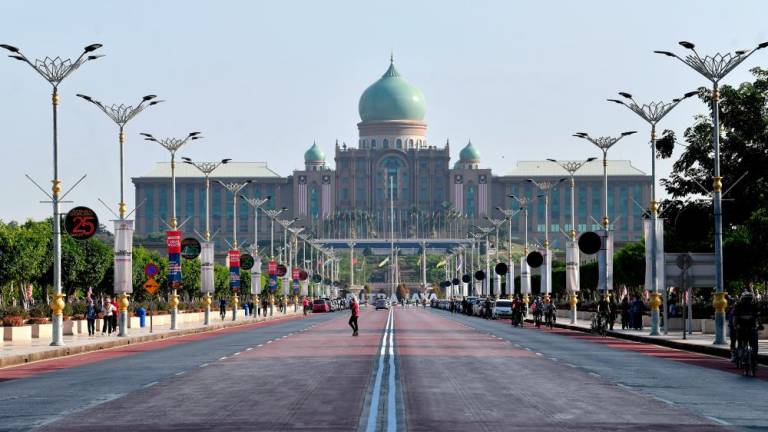“Laws grind the poor, and rich men rule the law.” – Oliver Goldsmith
THE government’s decision to form a Royal Commission of Inquiry (RCI) to investigate the allegations of judicial interference and misconduct made by Court of Appeal judge Justice Datuk Dr Hamid Sultan Abu Backer has drawn widespread approval and support, including from the Bar Council, retired judges and civil society organisations.
However the public should not have its hopes too high or expect that the RCI will end up with a reformed law system or a more independent judiciary.
The fact is that RCIs, in whatever country, when they are held, tend to be part of the ruling government’s political agenda.
They are also ultimately dependent in their impact on the willingness of the government to implement recommendations arrived at by the members appointed to the RCI.
And as we have seen from the experience with the RCIs on Sabah’s illegal immigrant issue, the V.K. Lingam video clip case, and the Teoh Beng Hock case, despite the significant public and media attention they garnered, they ended with lots of “sound and fury”; “signifying nothing” or little.
What rules the law?
If this is seen as being too cynical let us consider this of the legal profession which all judges are rooted in.
In an exchange with Tommy Koh, the Singaporean lawyer-diplomat reminded me that members of the legal profession did not comprise members of the world’s oldest profession, perhaps only second.
He may have intended it as a tongue in cheek criticism of my position on the subject. After all, law students and practitioners constantly remind us of their legal maxim: “Fiat justitia ruat coelum” or “Let justice be done, though the heavens fall”.
Whatever anyone’s opinion of lawyers derived from personal experience, we should not forget that lawyers generally sell their services to the higher bidder; and there needs to be concern about how unevenly tilted the scales of justice have become.
Not surprisingly, there has been little discussion of this topic though we have had a courageous whistleblower, Justice N H Chan, who called attention to the shortcomings of some of his former judicial colleagues
To him, the epitome of justice is a fair trial and this requires that the judge must do justice according to law – “this is what the rule of law is all about”. The judge must be fair and impartial.
At the same time, it is important that even litigants who lose should feel that they had a fair trial.
Justice Chan also felt that the public should have sufficient knowledge to enable them to judge the performance of the judges.
However, even when there is public scrutiny – which rarely happens except in the most attention-grabbing of cases – it appears to be well nigh impossible to bring any one from the judiciary – from the lowest magistrate level to the highest level of federal supreme judge – to book for any abuse of power, corrupt practice or judgment or judicial behaviour seen to be unfair or unjust.
Even or uneven scales of justice
Being fair and impartial means that each and all members of the judiciary especially have to rise above the factors of class, race or religion in arriving at judgment in our multiracial society.
Do integrity and impartiality constitute the norm or is the judiciary influenced by extraneous factors in the cases they hear?
To what extent, for example, are members of the judiciary influenced by the racial identity of the accused and/or of the lawyers in the cases they hear?
Are they likely to be more lenient when sentencing members from the rich and powerful strata of society or from members of their own racial grouping?
Are they biased against those from the poorer classes who do not have the services of expensive lawyers to ensure that they get a fair trial or against those from different racial or religious groups?
These and similar questions have seldom been discussed in the public realm.
Colleagues from the legal fraternity to whom these questions have been addressed, although generally agreeing that the judiciary is far from being independent or free from political influence, tell me that the scales of justice are generally evenly and fairly administered in Malaysia in terms of the influence of race and religion.
The findings in the 2018/9 Rule of Law Index conducted by the World Justice Project appear to contradict this view. This is Malaysia’s score on the following components of civil and criminal law
Civil justice
No discrimination 0.55
No corruption 0.66
No improper government
influence 0.49
Accessibility and
affordability 0.58
Criminal justice
No discrimination 0.47
Due process of law 0.54
No improper government
influence 0.39
Timely and effective
adjudication 0.57
What the data indicates – the index is based on over 120,000 household and 3,800 expert surveys though we do not know the details of this sampling for Malaysia – is that one of every two cases of civil and criminal justice in the country is tainted by discriminatory or corrupt action by the law enforcement agencies, including the judiciary.
Can the RCI open the Pandora’s box?
Public attention shortly will be focused on the case of judicial misconduct and interference in government.
However in a robust democracy, it is equally if not more important to ensure that the rule of law – as experienced in practical, everyday situations by ordinary people – is subject to scrutiny and reform so that it is fair and impartial in all aspects.
A good example of such public examination is that conducted by British Columbia in its 2012 Justice Reform Initiative which resulted in a white paper and road map for justice reform.
We are sorely in need of such an initiative or minimally a public discussion on the coming RCI on this ignored and neglected aspect of the rule of law.
Lim Teck Ghee’s “Another Take” is aimed at demystifying status quo orthodoxy. Comments: letters@thesundaily.com














